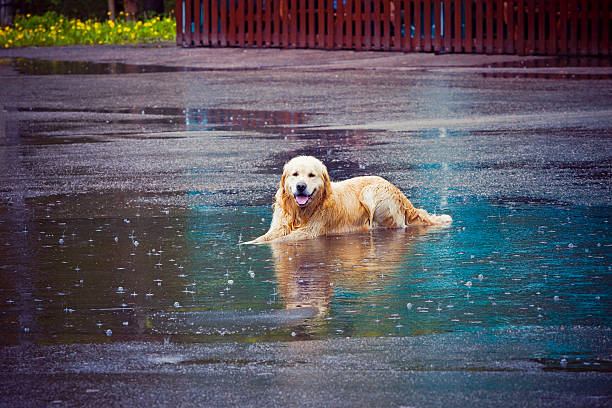Common digestive problems in pets During Monsoon & How To Handle Them
The monsoon season brings a refreshing break from the heat, but for pet parents, it also comes with a new set of challenges—especially when it comes to their furry friend’s health. With increased humidity, muddy surroundings, and contaminated water sources, digestive issues in pets become surprisingly common during this time.
Whether it's a playful pup licking dirty puddles or a curious cat nibbling spoiled food, the risk of upset stomachs, vomiting, and diarrhea rises significantly. As a responsible pet owner, it’s crucial to recognize these problems early and know how to manage them effectively.
In this blog, we’ll explore the most common digestive problems cats and dogs face during the rainy season, how to handle them at home, and when to consult a vet. Plus, we’ll highlight essential gut health supplements to keep your pet’s digestion strong and stable all monsoon long.
Common Digestive Problems in Pets During Monsoon
Diarrhea
• Cause: Spoiled food, sudden dietary changes, or contaminated water.
• Symptoms: Loose stools, frequent defecation, lethargy, and dehydration.
• Tip: Feed bland food (like boiled rice and chicken) and keep your pet hydrated. Seek veterinary help if it persists.
Vomiting
• Cause: Eating garbage, drinking rainwater, or gastrointestinal infections.
• Symptoms: Repeated vomiting, drooling, loss of appetite.
• Tip: Withhold food for a few hours, then offer small bland meals. Persistent vomiting requires immediate vet care.
Worm Infestations
• Cause: Rainy weather increases exposure to parasites in mud and stagnant water.
• Symptoms: Weight loss, vomiting, diarrhea, bloated abdomen.
• Tip: Deworm regularly and avoid letting pets drink from puddles.
Food Poisoning
• Cause: Consumption of spoiled or contaminated food.
• Symptoms: Vomiting, diarrhea, abdominal pain, fever.
• Tip: Discard leftovers daily, refrigerate wet food, and avoid giving raw food in the rainy season.
Gastritis
• Cause: Infections, table scraps, or ingesting foreign objects.
• Symptoms: Loss of appetite, vomiting, excessive licking of lips.
• Tip: Stick to a consistent diet and avoid overfeeding or giving human food.
✅ How to Handle Digestive Issues During Monsoon
Watch What They Eat
Use fresh, high-quality food. Avoid giving street food or table scraps.
Provide Clean Drinking Water
Always offer filtered or boiled water. Change the water bowl regularly to prevent bacterial buildup.
Practice Good Hygiene
Wash your pet’s food and water bowls daily. Store dry food in airtight containers to avoid moisture.
Follow a Deworming Schedule
Deworm your pet every 3 months or as advised by your vet.
Don’t Delay Veterinary Attention
Digestive issues can worsen quickly. Seek a vet’s advice if symptoms persist beyond 24 hours.
🧬 Gut Health Supplements to Support Digestion During Monsoon
Probiotics
Maintain a healthy balance of gut bacteria, improve digestion, and boost immunity.
Common Types: Probiotic powders, chews, or capsules.
Prebiotics
Feed the good bacteria in the gut and enhance the effectiveness of probiotics.
Sources: Found in some high-fiber foods or included in combination supplements.
Digestive Enzymes
Digestive enzymes help break down proteins, fats, and carbs for better nutrient absorption. When to Use: Ideal for pets with sensitive stomachs or frequent bloating.
Natural Fiber Supplements
Regulate bowel movements and prevent constipation or diarrhea.
Sources: Pumpkin powder, psyllium husk, sweet potato-based chews.
Electrolyte & Hydration Support
Electrolyte for pets replenish lost fluids and minerals during bouts of vomiting or diarrhea.
Example: Oral rehydration salts (ORS) designed for pets.
Final Thoughts
The monsoon can be a tricky time for your pet’s tummy, but with proper care, a clean environment, and a balanced diet, you can keep digestive issues at bay. Be observant of your pet’s eating habits and hygiene to ensure a healthy, happy rainy season.
Brands like Aniamor Nutrition offer scientifically formulated gut health supplements for pets, including probiotics, fiber blends, and enzyme boosters that are perfect for supporting digestion during the monsoon.
FAQs
1. Why do pets suffer from digestive issues during the monsoon?
The humidity and damp conditions during monsoon increase the risk of bacterial infections, food spoilage, and parasite exposure, all of which can upset your pet's digestive system.
2. Can I give homemade remedies for my pet’s diarrhea?
Mild diarrhea can sometimes be managed with bland food like boiled chicken and rice. However, always consult a vet before trying any home remedies.
3. How often should I deworm my pet during the rainy season?
Deworming every 3 months is recommended, but during monsoon, your vet might suggest more frequent doses depending on your pet’s exposure and condition.
4. What are signs that my pet needs a digestive supplement?
Signs include frequent bloating, irregular stools, vomiting, gas, and lack of appetite. A vet can guide you on the right supplement like probiotics or digestive enzymes.
5. Is AniAmor Nutrition a good brand for pet gut supplements?
Yes, Aniamor Nutrition offers a range of pet supplements made with natural and vet-approved ingredients. They focus on improving gut health, boosting immunity, and supporting overall wellness in pets.

